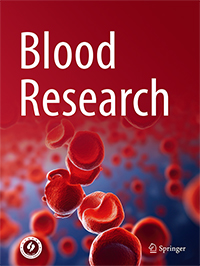Original Article
Korean J Hematol 2008; 43(3):
Published online September 30, 2008
https://doi.org/10.5045/kjh.2008.43.3.145
© The Korean Society of Hematology
포임스증후군에서 보테조입 유도요법과 자가조혈모세포이식
강석휘 이종율 전상훈 박형욱 민창기 김춘추 김명신 김용구
가톨릭대학교 성모병원 내과, 병리학과
Bortezomib Therapy Followed by Autologous Stem Cell Transplantation in POEMS Syndrome
Background: The acronym POEMS refers to polyneuropathy, organomegaly, endocrinopathy, M protein, and skin changes. Increased levels of cytokines, including vascular endothelial growth factor (VEGF), appear to play a pathogenic role. POEMS syndrome is progressive and eventually leads to death from neurological problem without therapy. Methods: We treated 3 patients affected by POEMS syndrome with front-line bortezomib treatment and the high-dose melphalan with autologous stem cell transplantation (ASCT). Results: Bortezomib reduced circulating levels of VEGF in sera. After a median follow-up of 18 months (range, 16∼20), all patients are alive with progressive improvement in neurological disease, skin changes, performance status and have no evidence of clonal plasmacytosis or organomegaly. Conclusion: ASCT following bortezomib treatment may be a potential treatment option for patients with POEMS syndrome. (Korean J Hematol 2008;43:145-149.)
Keywords POEMS syndrome, Bortezomib, Vascular endothelial growth factor, Autologous stem cell transplantation, Peripheral neuropathy
Article
Original Article
Korean J Hematol 2008; 43(3): 145-149
Published online September 30, 2008 https://doi.org/10.5045/kjh.2008.43.3.145
Copyright © The Korean Society of Hematology.
포임스증후군에서 보테조입 유도요법과 자가조혈모세포이식
강석휘 이종율 전상훈 박형욱 민창기 김춘추 김명신 김용구
가톨릭대학교 성모병원 내과, 병리학과
Bortezomib Therapy Followed by Autologous Stem Cell Transplantation in POEMS Syndrome
Seok Hui Kang, Jong Yul Lee, Sang Hoon Chun, Hyung Wook Park, Chang Ki Min, Chun Choo Kim, Myung shin Kim, Yong goo Kim
Departments of Internal Medicine, Hospital Pathology, St. Mary's Hospital, The Catholic University of Korea, Seoul, Korea
Abstract
Background: The acronym POEMS refers to polyneuropathy, organomegaly, endocrinopathy, M protein, and skin changes. Increased levels of cytokines, including vascular endothelial growth factor (VEGF), appear to play a pathogenic role. POEMS syndrome is progressive and eventually leads to death from neurological problem without therapy. Methods: We treated 3 patients affected by POEMS syndrome with front-line bortezomib treatment and the high-dose melphalan with autologous stem cell transplantation (ASCT). Results: Bortezomib reduced circulating levels of VEGF in sera. After a median follow-up of 18 months (range, 16∼20), all patients are alive with progressive improvement in neurological disease, skin changes, performance status and have no evidence of clonal plasmacytosis or organomegaly. Conclusion: ASCT following bortezomib treatment may be a potential treatment option for patients with POEMS syndrome. (Korean J Hematol 2008;43:145-149.)
Keywords: POEMS syndrome, Bortezomib, Vascular endothelial growth factor, Autologous stem cell transplantation, Peripheral neuropathy

Article Tools
Stats or Metrics
Related articles in BR
-
Real-world incidence and risk factors of bortezomib-related cardiovascular adverse events in patients with multiple myeloma
Bitna Jang, Jonghyun Jeong, Kyu‑Nam Heo, Youngil Koh and Ju‑Yeun Lee
Blood Res 2024; 59(): -
Update on the POEMS syndrome
Yu Ri Kim
Blood Res 2022; 57(S1): S27-S31 -
Outcomes of bortezomib combination chemotherapies in autologous stem cell transplantation-ineligible patients with AL amyloidosis
Joon Young Hur, Sang Eun Yoon, Darae Kim, Jin-oh Choi, Ju-Hong Min, Byung Jun Kim, Jung Sun Kim, Jung Eun Lee, Joon Young Choi, Eun-Seok Jeon, Seok Jin Kim, Kihyun Kim
Blood Res 2021; 56(4): 266-278




 PDF
PDF Standard view
Standard view Export citation
Export citation Share
Share  Previous Article
Previous Article



